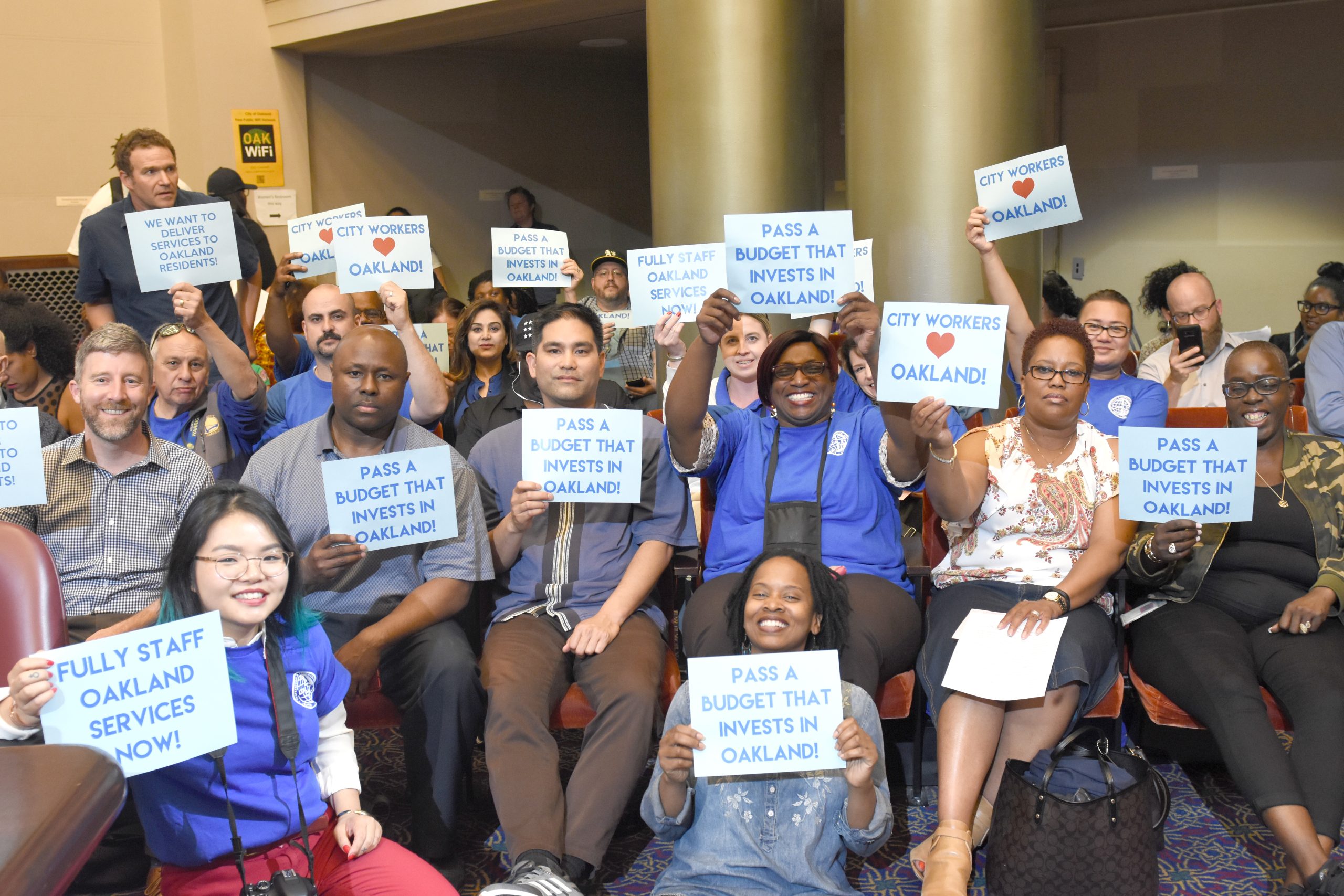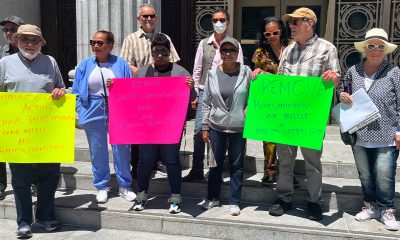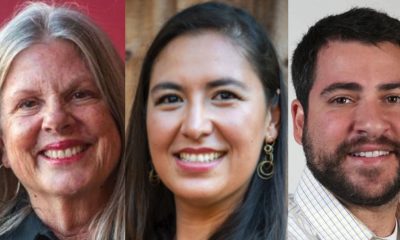Activism
Schaaf Administration declares impasse on labor negotiations despite union objections

The conflict between Mayor Libby Schaaf’s administration and city workers is intensifying after Oakland officials declared an impasse in negotiations with two major employee unions just before their labor contracts expire on June 30, the same day as the deadline for submitting the new city budget.
The city proclaimed the impasse on June 11 with Service Employees International Union (SEIU) Local 1021, which represents about 2,000 city employees; and the International Federation of Professional and Technical Engineers (IFPTE) Local 21, representing about 1,000 workers. Both unions have been meeting with the city’s representatives for months, Local 1021 in about 20 negotiating sessions since the end of March and Local 21 in about 15 sessions since February.
Until the declaration of impasse, negotiations were continuing and had not stalled, according to the unions. Undiscussed issues were still on the table. The city is engaging in “bad faith bargaining,” said union leaders, who are filing a complaint against the city with the Public Employee Relations Board (PERB).
The city has proposed mediation, an action that the unions view as an attempt to put pressure on them. Though they argue that city’s declaration is premature, the unions say they are willing to participate in mediation.
In recent years, the city’s negotiating team consisted of City of Oakland staff. This year, the administration relied on an outside consultant, Sloan Sakai, which has a reputation among union members as a hostile or “union busting” law firm.
The city is offering a 2 percent raise per year, 4 percent for the next two years, as well as a number of takeaways, according to city workers, who say they need to keep up with the rate of inflation. The cost of living in the Bay Area increased almosst 4 percent in the past year, say the unions.
Workers’ wages fell far behind between 2008 and 2014, and many say they cannot afford to continue to live in Oakland, and some are straining to pay for long commutes from where they were forced to move.
Another major issue facing the city are large numbers of unfilled employee positions, which undermines the ability of workers to adequately perform their jobs and overwhelms them with excessive workloads, often having to scramble to do the duties of two, three or four employees, according to workers. There are currently over 600 vacant positions in the city, including public works, housing and transportation jobs.
During the City Council’s budget deliberations, the dispute between the unions and the administration has taken center stage. City workers filled Council Chambers both at last week’s and Tuesday evening’s council meetings.
Speaking at the meeting, Local 1021 member Jeff Robbins, talked about the shortages of employees in the department where he works as a licensed heavy equipment mechanic.
He said the department is short four mechanics and cannot hire anyone because “other municipalities pay $10 more per hour with less requirements.”
“All city heavy equipment passes through us, including fire equipment,” he said. “We never want a shortage of equipment when fires need to be put out (or) trees need to be trimmed.”
“We’re the hub of the wheel – don’t let the wheel fall off.”
Local 1021 bargaining team co-chair and Chapter President Felipe Cuevas, also a heavy equipment mechanic, talked about the many unfilled vacancies exist in many city departments.
“Local 1021 has more than 300 vacancies, an over 17 percent vacancy rate,” he said . “I’ve seen vehicles sometimes wait for months to be repaired. These vehicles are not available to provide services to the public: fire trucks are not on the road, potholes are not getting fixed, sewers are not being inspected and maintained.”
“In the past we had to close fire houses because the equipment hasn’t been available,” he said. “No one has heard about that.”
Cuevas said the behavior of the city’s negotiators, Sloan Sakai, has been “so disrespectful.”
“They’ve basically said we’re not even going to discuss some of (our) proposals. They’re simply union busters.”
Also criticizing the city’s negotiating consultants, Local 1021 chief steward Dwight McElroy said, “I’ve been bargaining in this city for 25 years, and I’ve never seen such disrespect as we have seen at this table.”
Look at Sloan Sakai’s website, he said. “It is braggadocious about union busting (and) braggadocious about” taking away local cities’ retiree benefits.
McElroy told the council, “We know you’ve been stonewalled. We know you haven’t been given documents that you requested, to make educated decisions.”
Nina Hernandez, a part-time library worker, said, “We went out (in the last strike) because 2 percent was never going to cut it for this staff. And it is never going to cut it, ever, because 2 percent makes us poorer at the end of the contract than we were at the beginning of the contract.”
Anthony Reese, chapter vice president of Local 21, said the city’s contract proposal contributes to gentrification by failing to keep up with the increased cost of living. “It’s clear that the mayor does not want us to live and work here,” he said.
Cheryl Dunaway, a 22-year city employee and a Local 21 member, said she became homeless and had to leave the city.
“I work in Oakland, but I can’t afford to live in Oakland,” she said. “I used to, but now I can’t. I commute around four hours a day.”
“Some of our employees are homeless but are too ashamed to admit it,” Dunaway continued. “I was one of them. I was blessed that I have family that loves me, that took me in. But a lot of us don’t have that. They’re sleeping in cars, bunking with family members, they are sleeping on garage floors.”
She said employees will not accept a 2 percent increase and takeaways.
“If you are not willing to work with us, all of us are going to walk out the door. And you’ll be left with yourselves,” she said.
Activism
Oakland Post: Week of April 17 – 23, 2024
The printed Weekly Edition of the Oakland Post: Week of April 17 – 23, 2024

To enlarge your view of this issue, use the slider, magnifying glass icon or full page icon in the lower right corner of the browser window. ![]()
Activism
Oakland Schools Honor Fred Korematsu Day of Civil Liberties
Every Jan. 30, OUSD commemorates the legacy of Fred Korematsu, an Oakland native, a Castlemont High School graduate, and a national symbol of resistance, resilience, and justice. His defiant stand against racial injustice and his unwavering commitment to civil rights continue to inspire the local community and the nation. Tuesday was “Fred Korematsu Day of Civil Liberties and the Constitution” in the state of California and a growing number of states across the country.

By Post Staff
Every Jan. 30, OUSD commemorates the legacy of Fred Korematsu, an Oakland native, a Castlemont High School graduate, and a national symbol of resistance, resilience, and justice.
His defiant stand against racial injustice and his unwavering commitment to civil rights continue to inspire the local community and the nation. Tuesday was “Fred Korematsu Day of Civil Liberties and the Constitution” in the state of California and a growing number of states across the country.
One OUSD school is named in his honor: Fred T. Korematsu Discovery Academy (KDA) elementary in East Oakland.
Several years ago, founding KDA Principal Charles Wilson, in a video interview with anti-hate organization “Not In Our Town,” said, “We chose the name Fred Korematsu because we really felt like the attributes that he showed in his work are things that the children need to learn … that common people can stand up and make differences in a large number of people’s lives.”
Fred Korematsu was born in Oakland on Jan. 30, 1919. His parents ran a floral nursery business, and his upbringing in Oakland shaped his worldview. His belief in the importance of standing up for your rights and the rights of others, regardless of race or background, was the foundation for his activism against racial prejudice and for the rights of Japanese Americans during World War II.
At the start of the war, Korematsu was turned away from enlisting in the National Guard and the Coast Guard because of his race. He trained as a welder, working at the docks in Oakland, but was fired after the bombing of Pearl Harbor in 1941. Fear and prejudice led to federal Executive Order 9066, which forced more than 120,000 Japanese Americans out of their homes and neighborhoods and into remote internment camps.
The 23-year-old Korematsu resisted the order. He underwent cosmetic surgery and assumed a false identity, choosing freedom over unjust imprisonment. His later arrest and conviction sparked a legal battle that would challenge the foundation of civil liberties in America.
Korematsu’s fight culminated in the Supreme Court’s initial ruling against him in 1944. He spent years in a Utah internment camp with his family, followed by time living in Salt Lake City where he was dogged by racism.
In 1976, President Gerald Ford overturned Executive Order 9066. Seven years later, the 9th Circuit Court of Appeals in San Francisco vacated Korematsu’s conviction. He said in court, “I would like to see the government admit that they were wrong and do something about it so this will never happen again to any American citizen of any race, creed, or color.”
Korematsu’s dedication and determination established him as a national icon of civil rights and social justice. He advocated for justice with Rosa Parks. In 1998, President Bill Clinton gave him the Presidential Medal of Freedom saying, “In the long history of our country’s constant search for justice, some names of ordinary citizens stand for millions of souls … To that distinguished list, today we add the name of Fred Korematsu.”
After Sept. 11, 2001, Korematsu spoke out against hatred and discrimination, saying what happened to Japanese Americans should not happen to people of Middle Eastern descent.
Korematsu’s roots in Oakland and his education in OUSD are a source of great pride for the city, according to the school district. His most famous quote, which is on the Korematsu elementary school mural, is as relevant now as ever, “If you have the feeling that something is wrong, don’t be afraid to speak up.”
Activism
WOMEN IMPACTING THE CHURCH AND COMMUNITY
Juanita Matthews, better known as “Sister Teacher,” is a walking Bible scholar. She moved to California from the great state of Arkansas in 1971. Sister Teacher has a passion for teaching. She has been a member of Bible Fellowship Missionary Baptist Church since 1971.

Sister Juanita Matthews
55 Years with Oakland Public School District
The Teacher, Mother, Community Outreach Champion, And Child of God
Juanita Matthews, better known as “Sister Teacher,” is a walking Bible scholar. She moved to California from the great state of Arkansas in 1971. Sister Teacher has a passion for teaching. She has been a member of Bible Fellowship Missionary Baptist Church since 1971. She followed her passion for teaching, and in 1977 became the lead teacher for Adult Class #6. Her motto still today is “Once My Student, Always My Student”.
Beyond her remarkable love for the Lord, Sister Teacher has showcased her love for teaching by working for the Oakland Unified School District for 55 years, all but four of those years spent at Emerson Elementary and Child Development School. She truly cares about her students, making sure they have the tools/supplies needed to learn either at OUSD or Bible Fellowship Missionary Baptist Church.
She’s also had a “Clothes Closet Ministry” for 51 years, making sure her students have sufficient clothing for school. The Clothes Closet Ministry extends past her students, she has been clothing the community for over 50 years as well. She loves the Lord and is a servant on a mission. She is a loving mother to two beautiful children, Sandra and Andre. This is the impact this woman of God has on her church and the community.
-

 Activism4 weeks ago
Activism4 weeks agoOakland Post: Week of March 27 – April 2, 2024
-

 #NNPA BlackPress4 weeks ago
#NNPA BlackPress4 weeks agoCOMMENTARY: D.C. Crime Bill Fails to Address Root Causes of Violence and Incarceration
-

 #NNPA BlackPress4 weeks ago
#NNPA BlackPress4 weeks agoMayor, City Council President React to May 31 Closing of Birmingham-Southern College
-

 #NNPA BlackPress4 weeks ago
#NNPA BlackPress4 weeks agoBeloved Actor and Activist Louis Cameron Gossett Jr. Dies at 87
-

 Community1 week ago
Community1 week agoFinancial Assistance Bill for Descendants of Enslaved Persons to Help Them Purchase, Own, or Maintain a Home
-

 Activism3 weeks ago
Activism3 weeks agoOakland Post: Week of April 3 – 6, 2024
-

 Business1 week ago
Business1 week agoV.P. Kamala Harris: Americans With Criminal Records Will Soon Be Eligible for SBA Loans
-

 Activism2 weeks ago
Activism2 weeks agoOakland Post: Week of April 10 – 16, 2024
























































